Lessons from Awori the generalist show that athletics’ zero-sum game is a bad experiment

Author: Robert Madoi is a sports journalist and analyst. PHOTO/FILE/NMG.
What you need to know:
- The Games get underway on July 23 under the spectre of a virus that killed Awori
The passing of Aggrey Awori this past week was felt deeply across Uganda’s stark divides. It is easy to see why. Awori demonstrated his range in a life that straddled a little over eight decades, hopping – metaphorically if not literally (he was a 110m hurdler) – from sports to politics. As well as hurdling 110m, he ran the 100m dash and lead leg on the relay at two Olympic Games in Rome (1960) and Tokyo (1964).
When he retired from sport, he carved a career in politics that saw him – much like the hurdles on the track – confront leaders whose dreams were dangerous in the extreme. He often went into the midst of such leaders and dared them to do their worst. If his flowery speeches were the result of a stint spent at Harvard University between 1961 to 1965, sport could lay claim to toughening him up. He had bruises – physical and mental – to attest to his resilience on the track.
While Awori’s performances at the Olympics in Rome and Tokyo were solid, he steadily closed the gap on his opponents. But not quite enough. For instance, his best time in the 110m hurdles in Rome was 14.94sec. He managed a wafer-thin improvement, clocking 14.6sec in Tokyo. During the lead-up to the 2001 presidential elections, Awori occasionally spoke about being a two-time Olympian with an indignant passion. The annoyance was understandable.
It is almost as if his interviewers had suggested the appearances were no more than a footnote.
Sport was fundamental to Awori, and a rubric for exploring themes that would go on to resonate more widely with his life choices. He was among the 13 athletes that marched behind Uganda’s flag inside the Olympic Stadium at the 1964 Games. It is such a pity that he passed away days before Team Uganda’s nearly 30 qualified athletes marched behind the national flag in the same stadium.
The 2020 Games belatedly get underway on July 23 under the spectre of a virus that took Awori’s life. Uganda will field a team that is a polar opposite of the one Awori was part of. Sprinters like Awori dominated our track team at 11 of those games. Initially, the sprinters discovered that they were up against the ropes with no clear remedy to their predicament.
The medal-winning performances of 400m hurdler John Akii-Bua in 1972 and 400m sprinter Davis Kamoga in 1996 saw the art of sprinting pick up renewed vigour at different turns. This, though, was sporadic. Repeated poor performances of sprinters, however, threw sand in the gears.
The tide effectively turned at the 2004 Games when Boniface Kiprop showed that – unlike sprinters – distance runners could shift out of first gear. Since then athletes like Stephen Kiprotich, Joshua Cheptegei, Moses Kipsiro, Boniface Kiprop and Dorcus Inzikuru have surpassed expectations with the scope of their ambition. But if there is one thing we can learn from Awori’s athletics career, it is that this need not be a zero-sum game. Awori eschewed being a specialist. He instead sported the hat of a generalist, showing his range in the 100m, 200m, 110m hurdles, and relay events.
Many times Uganda’s rich culture is reduced to a chaotic diversity of competing interests. It should not. We must instead make the most of the tapestries. If high-altitude training has yielded elite endurance athletes from Mount Elgon’s slopes, other low-hanging fruits should not be ignored. And it is not just sprinting under the microscope here. It might not be a coincidence that the central region has in years gone by unearthed decent middle-distance runners. Think Halimah Nakaayi, Winnie Nanyondo, Ronald Musagala and Grace Birungi.
Also, once upon a time, Uganda was spoken of as an up-and-coming force in field events. At the 1978 All-Africa Games in Algiers, Algeria, we picked five medals from field events. Two of them were gold, including Justin Arop in the javelin throw and Joyce Aciro in shot put. There were a trio of silver medals from Helen Alyek in the discus throw, Margaret Bisereko in pentathlon, and Fidelis Ndyabagye in long jump. Not bad, huh?
If all probable options were relentlessly explored, maybe Team Uganda could have done more than just double the number it sent to Tokyo in 1964 when Awori had his Olympic curtain call.
Email: [email protected]
Twitter: @robertmadoi




